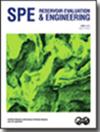Robust and Efficient Identification of Hydraulic Flow Units using Differential Evolution Optimization and Two-Stage Clustering Techniques
IF 1.5
4区 工程技术
Q3 ENERGY & FUELS
引用次数: 0
Abstract
One essential process in reservoir characterization is the identification of hydraulic flow units (HFUs). It plays a critical role in determining hydrocarbon reserves and improving reservoir productivity. Flow zone indicator (FZI), determined from core data, is widely used to identify HFUs. One of the challenges in the FZI technique is that the number of HFUs is identified using qualitative methods and subjective estimation. This work proposes robust methods to identify the optimal HFUs using differential evolution (DE) and two-stage clustering. The first method tested in this work enumerates through a large number of HFUs scenarios using 10 clustering algorithms and different input parameters (number of clusters, minimum number of samples, etc.). The scenario with the largest average correlation coefficient is selected as optimum. The second method uses the DE algorithm to maximize the average correlation coefficient and hence obtain the optimal HFUs. The third method consists of two stages. The first stage uses the OPTICS clustering algorithm to determine the number of HFUs, while the second stage generates the desired clusters using the Gaussian mixture algorithm. Both iterative evaluation and DE optimization methods achieved the same clustering results. However, DE optimization resulted in 85% reduction in runtime due to the robust search capability of the DE algorithm which leads to the solution more efficiently. Furthermore, another significant reduction in runtime was achieved using the two-stage clustering method which yielded very close results. The proposed methods in this work provide unique and potential opportunity to improve the use of FZI data analysis to identify HFUs. This work uses the power of clustering and stochastic algorithms to support a critical process in reservoir characterization.基于差分进化优化和两阶段聚类技术的液压流量单元鲁棒高效识别
储层表征的一个重要过程是水力流动单元(hfu)的识别。它在确定油气储量和提高储层产能方面起着至关重要的作用。从岩心数据中确定的流量区指标(FZI)被广泛用于识别hf。FZI技术面临的挑战之一是,hfu的数量是通过定性方法和主观估计来确定的。这项工作提出了鲁棒的方法来识别最优的hfu使用差分进化(DE)和两阶段聚类。本工作中测试的第一种方法使用10种聚类算法和不同的输入参数(聚类数量、最小样本数量等)枚举了大量的hfu场景。选取平均相关系数最大的场景作为最优方案。第二种方法使用DE算法最大化平均相关系数,从而获得最优的hfu。第三种方法包括两个阶段。第一阶段使用OPTICS聚类算法来确定hff的数量,而第二阶段使用高斯混合算法生成所需的聚类。迭代评价和DE优化方法的聚类结果相同。然而,DE优化导致运行时减少85%,因为DE算法具有强大的搜索能力,从而使解决方案更有效。此外,使用两阶段聚类方法可以显著减少运行时间,结果非常接近。本工作中提出的方法为改进FZI数据分析识别hff的使用提供了独特的潜在机会。这项工作利用聚类和随机算法的力量来支持油藏表征的关键过程。
本文章由计算机程序翻译,如有差异,请以英文原文为准。
求助全文
约1分钟内获得全文
求助全文
来源期刊
CiteScore
5.30
自引率
0.00%
发文量
68
审稿时长
12 months
期刊介绍:
Covers the application of a wide range of topics, including reservoir characterization, geology and geophysics, core analysis, well logging, well testing, reservoir management, enhanced oil recovery, fluid mechanics, performance prediction, reservoir simulation, digital energy, uncertainty/risk assessment, information management, resource and reserve evaluation, portfolio/asset management, project valuation, and petroleum economics.

 求助内容:
求助内容: 应助结果提醒方式:
应助结果提醒方式:


